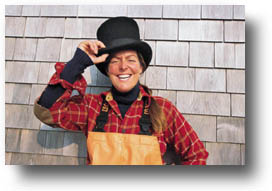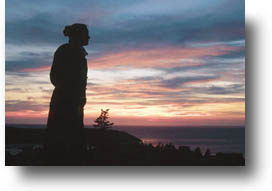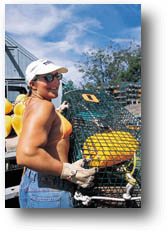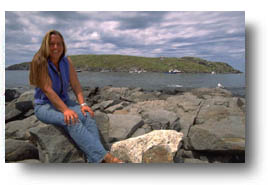

| Copyright © 2002-2004 Equinox Enterprises Terms and Conditions |
|||
 An Interview with Zoe A. Zanidakis
An Interview with Zoe A. Zanidakisby Carol Amore, Executive Producer, Wildlife Worlds
CA: What makes you passionate about the lifestyle of lobstering/fishing?
ZAZ: The excitement of the ocean and all it holds, my ability to work within it. It brings a certain freedom, independence and satisfaction at the end of the work day. I’m living my passion!
CA: How did you get into the lobstering profession?
ZAZ: It’s in my blood with nine generations of fishing history on the island. But actually getting into the business was my doing with the help of some significant mentors. I needed the money to support myself and my son. It also fulfilled my love of the ocean and adventure.
CA: When do you first remember going out on a lobster boat?
ZAZ: Being on the Island is all about boats. My great grandfather Chris's boat was named after my mother, Jean-E. I guess that was the first lobster boat I remember going on. All the men in my family have been fishermen. All the women have been strong business entrepreneurs. I'm a hybrid of both—the fishing profession and a woman entrepreneur.
CA: What was it like growing up on this island?
ZAZ: Brilliant place to grow up, freedom at a young age to explore with almost no boundaries. Of course, the ocean was a bit of a boundary to the rest of the world, but I was in it a good part of the time as a youngster and I am in it even now—I'm still growing up.
 CA: What does it mean to you to be carrying on the family tradition?
CA: What does it mean to you to be carrying on the family tradition?ZAZ: It feels good to do what you must love what you do to make it work—as a family we've all had a love for the ocean and for the work that we do.
CA: What's an average day in the life of Zoe from sunrise to sunset?
ZAZ: Always full of some sort of adventure, whether on my boat or on the shore, there is always something to get done, or someone to see, occasional surprises-not much time for napping. I always try to keep my focus and stay motivated.
CA: What personal characteristics does it take to be a lobster captain?
ZAZ: A good pair of “sea legs!" A true passion for the occupation, a healthy dose of determination to keep at it with a positive attitude. Independence, perseverance and personal stamina are a few of the key ingredients. GUTS is really what it takes.
CA: How do you use your sense of humor to help others feel comfortable?
ZAZ: My sense of humor helps motivate me, and I've found it helps relax others, particularly the tougher the situation gets. I love a good laugh!
CA: How are you different from other sea captains?
 ZAZ: I have bigger biceps and I look better in a bikini.
ZAZ: I have bigger biceps and I look better in a bikini.CA: What makes you unique in your style of lobstering?
ZAZ: Attitude makes my style different. I adapt to all kinds of situations with a positive approach.
CA: What are your hopes in the lobstering business?
ZAZ: Lobstering is a way of life on Monhegan Island and I've made it my life for fifteen years. Lobstering on Monhegan is a healthy business and I hope with industry cooperation and our island fishing values it will stay intact.
CA: What attracts you to the adventure of lobstering?
ZAZ: The excitement of the ocean and working with the elements to come through it successfully. It makes me feel alive.
CA: What kinds of things do you think about when you are out at sea?
ZAZ: I live in the present. It can be a matter of life and death. The tasks at hand and the crew's safety are at the top of the list. Then maybe some quick tangential thoughts about seeing my son play hockey, a trip to Australia, or some wild project I might be working on—but not for long because the trap's coming up over the boat's rail and full of lobsters, at least I hope so. If not, time to shift the traps.
CA: What does WORK HARD and PLAY HARD mean to you?
ZAZ: It's how I live; it gives me balance.
CA: Whether you are walking down Monhegan's dirt road or navigating your boat, you frequently have a smile on your face and have a hug for everyone, what does that say about you and how you live your life?
ZAZ: Happy to be “alive and kickin’ ”—Hoping I can bring a bit of that to everyone I meet, if not then so be it. I can only create my own peace of mind. Life goes on.
 CA: Has there ever been any personal tragedy in your life that has made you a stronger person today?
CA: Has there ever been any personal tragedy in your life that has made you a stronger person today?ZAZ: My mother's death was a personal tragedy. She was young (52) and had not been well for a long time, but it still didn't make it any easier. I do know she is still with me in spirit every day.
CA: What do you feel about the community of Monhegan and what it emotionally gives to you?
ZAZ: Through all of its trials and tribulations, it's a great bunch of people who manage to coexist on a magnificent magical island. Maybe it's the magic of the island that makes it work?
CA: Being the only woman in the Monhegan fishing fleet, what does it take to gain respect and credibility amongst your peers?
ZAZ: A lot of work and persistence in all sorts of conditions and enough energy left to celebrate-also being able to learn from all your mistakes-just do better next time.
CA: What lessons do you learn from being a lobster boat captain that prepare you for meeting life's challenges?
ZAZ: Be adaptable; it's the only way to really get things done and have a bit of fun doing it! It's one of my radical truths: “I believe in using intuition to navigate life's storms to make good choices.”
CA: What makes lobstering on Monhegan different from other places in Maine or in the world?
ZAZ: We have a legacy of over 100 years of traditional winter fishing. We consistently live the values of conservation in the ways we fish and work. We're a microcosm of other dedicated fishing communities of the world.
 CA: “Trap Day” for Monhegan's lobster fleet means something special, can you tell us what it means to you?
CA: “Trap Day” for Monhegan's lobster fleet means something special, can you tell us what it means to you?ZAZ: It's all for one and one for all as the fleet begins the winter lobster season. The Monhegan lobster fleet fishes their traditional grounds surrounding several miles of the island. Each captain has their own unique buoy color and design to mark their traps. On December 1st–Trap Day–all captains meet at the Fish House to decide on the risks of the weather conditions, the health of each captain, and each boat's operation readiness. The fleet is committed to setting traps together. The December lobster catch will determine a captain and crew's success; affecting the community in the coming year.
CA: What kinds of discussions go on in the “Fish House” or the inner sanctum for the Monhegan fishing community discussions?
ZAZ: It's time to take off the oil gear, dry off, and wet one's whistle with a bit of rum or beer for those who partake, or a Moxie or Coke for those who don't; that starts it all off. Aside from a cribbage game or two, many things are discussed from the weather to the lobster catch or price and maybe … well, if I told you any more I'd have to reveal secrets, so I'd better leave well enough alone.
CA: What kind of music do you listen to out at sea?
ZAZ: Just about anything that comes in, we don't need any more static noise, Rock and Roll is a usual good bet but the country station is good—depending on what the crew wants. They don't want me to start singing but we all sometimes join in singing like a chorus at sea.
CA: What's it like lobstering in Monhegan's winter seas?
ZAZ: Sometimes the wind's blowing some 30 to 40 knots on a “good day” which drops the temperature below zero. Some of the most treacherous conditions are when the wind chill factor creates “The vapor” and the salt water coating every surface of the boat forms an icy crust. Thank God it's not always like that!
CA: Are you afraid of anything at sea?
ZAZ: It is not a fear of the sea that I have, it's the utmost respect for Mother Nature when she's at her worst. There are lots of unpredictable situations to address. Most of all, I would never want any member of my crew hurt or entangled in lines.
CA: What are the tough decisions you have to make as a captain at sea?
ZAZ: Tough decisions are everyday choices-watching the tides, the best weather conditions, the right supplies, keeping equipment in good working order and sometimes difficult words are needed to keep the crew focused.
CA: How do you dress for winter weather when going into temperatures at 20 below zero?
ZAZ: Oil gear is great to protect against the wind and rain. Then I put on lots of layers underneath. Covering my hands and face are a concern since they are most vulnerable to frostbite which I've had on my hands.
 CA: What's your best “bad weather” story and how you and your crew made it through it?
CA: What's your best “bad weather” story and how you and your crew made it through it?ZAZ: While working with Shermie, an island fisherman and my mentor, we had to go out in really rough sea conditions. Sometimes, there is no choice. Ocean tankers usually pick up local pilots further south to steer the tanker's safe passage through Maine's waterways. We needed to pick one up at the end of his task and return him to the mainland. Pulling alongside the ocean tanker to make a transfer on a stormy night was more excitement than I wanted; the churning water between the boat and the tanker is an abyss you don't want to experience! The rope ladder swayed wildly, and the pilot stood a great chance of dropping into the rapids below. To make it more challenging, it was all navigating by instinct since the rain had taken the radar out.
CA: Have you ever had to rescue someone? What happened?
ZAZ: We delivered a heart attack victim from Monhegan to Port Clyde to meet an ambulance which could get him to a hospital. It was winter, in the middle of the night. Sea conditions were severe; southeasterly winds made dock-loading conditions difficult, with big swells. The wind speed was too great for a helicopter rescue. And so the ambulance brought Ray to the edge of the dock. Sleet conditions caused erratic radar readings and GPS was not working, so I had to use dead reckoning for the run. The open ocean area was the worst. For the first to six miles I had to follow a compass course. Ray's stretcher was tied to the engine block since 8- to 12-foot swells were tossing us around. A 30-minute ride took us one hour with these sea conditions. We finally reached the dock and lifted Ray to the safe hands of two EMS specialists. Ray made it through the ordeal and is back on the island.
CA: How do you select a crew to work for you? What characteristics do they need to have?
ZAZ: I look for a strong will and hardy work ethic, and a lot of physical stamina. Many have worked with me in the past, at other jobs or apprenticeships I try to become familiar with our compatibility and their strengths before we ever go out on the boat. They have to be trustworthy; being unreliable or unable to adapt quickly in a difficult situation at sea can mean the difference between life and death.
CA: What do you feel you could expect from a member of your crew who is a woman?
ZAZ: An honest day's work for an honest day's pay. Gender is not an issue.
CA: If you were ever faced with a 30 foot wave coming at you, what would you do?
ZAZ: “Ride 'em Cowboy! Giddy-Up!” Seriously, cut back on the throttle and hang on! A series of “breaker” waves over the bow could smash in the pilot's windows. It's an awesome force. You need to be persistent and patient in stormy conditions because everything takes twice the time.
CA: How do you welcome people coming to the island or say good-bye?
ZAZ: A welcome to the island starts with a good hug and of course food and drink. A good-bye is about the same but just going the other way— and always an island
flower or two to send off with someone leaving. They toss the flower overboard while on the boat and the flower floats back to shore, meaning they will return. But until then a little part of their spirit remains.
 CA: How do the lobster scientists communicate with the lobster captains? How do you both work together?
CA: How do the lobster scientists communicate with the lobster captains? How do you both work together?ZAZ: Most of our hands on research work done with scientists is communicated through a meeting of all involved at the School House or the Fish House. Monhegan is a unique lobster fishery because of its size, season and fishing effort. This situation makes it of interest to the scientific community. Helping them, in turn, helps keep us integrally involved in the outcome of the ever-changing fishing regulations.
CA: What makes living on Monhegan Island magical for you?
ZAZ: The air is intoxicating, and the light and the views at any given moment are brilliant. I feel very alive when I'm home on the island. It's that simple.
CA: Will your son chose a profession in lobstering/fishing?
ZAZ: My son Ron has had a good experience fishing but I don't think he will chose it as a profession. He's very athletic and has a strong drive to achieve. He does have a “fishing spirit"—he will be successful in whatever he does.
CA: What kind of hand cream do you use after a rough day at work?
ZAZ: Whatever is handy and lots of it.
CA: Do you eat lobster?
ZAZ: Better believe it!
CA: What is your favorite lobster recipe?
 ZAZ: I could eat my great grandmother Elva's lobster stew all week.
ZAZ: I could eat my great grandmother Elva's lobster stew all week.CA: What keeps you in the lobster business?
ZAZ: Fresh air and tough challenges.
CA: Are you happy with the price of lobster?
ZAZ: Never.
CA: What are your hopes for your future?
ZAZ: To always keep my home on Monhegan Island, make my second home on the big island of Australia. Most of all, exploring the world is my goal.